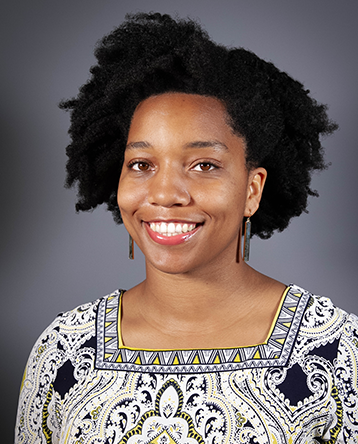Destenie Nock
Assistant Professor, Civil and Environmental Engineering, Engineering and Public Policy
Assistant Professor, Civil and Environmental Engineering, Engineering and Public Policy

Destenie Nock received her Ph.D. in 2019 from the University of Massachusetts Amherst. There, she performed energy systems modeling in both New England and Sub-Saharan Africa, using multi-criteria decision analysis and applied optimization to better equip policy makers to understand energy planning options. Nock’s broad research interests are focused around using mathematical modeling tools to address societal problems related to sustainability planning, energy policy, and engineering for social good. She has a breadth of professional experience, having worked in industry, national labs, and government settings on issues related to energy systems and equity.
2019 Ph.D., University of Massachusetts Amherst
CMU Engineering
A new study published in Nature Energy provides a foundation for understanding how Americans experience temperatures in their home.
CMU Engineering
Researchers from Carnegie Mellon and the University of Maryland found that an emerging technology known as heat pumps leads to reduced disparities in thermal comfort across different income groups.
CMU Engineering
College of Engineering researchers found that increased electric vehicle adoption can trigger new investment in sustainable energy generation and storage, making vehicle infrastructure greener.
WESA
CEE/EPP’s Destenie Nock was quoted by WESA about how the potential influx of data centers in Pennsylvania could lead to higher electricity costs for users.
CMU Engineering
People may be more likely to turn to ride-hailing services like Uber or Lyft for transportation during extremely hot weather, shows research from Carnegie Mellon engineering faculty.
University of Massachusetts Amherst
CEE/EPP’s Destenie Nock received an Outstanding Alumni Award from the University of Massachusetts Amherst, her alma mater, in recognition of her career in academia and as a startup founder.
Wilton E. Scott Institute for Energy Innovation
This post is part of a series exploring the impacts of federal investments in home electrification, transportation, supply chains, and climate resilience.
Phys.org
EPP’s Nicholas Muller and EPP Ph.D. student Luke Dennin were quoted in Phys.org on health risks associated with fire smoke.
Pittsburgh Tribune-Review
CEE/EPP’s Destenie Nock published a story in the Pittsburgh Tribune-Review about Peoples Energy Analytics, an organization that helps connect people with assistance programs to cover home energy costs.
CMU Engineering
Researchers develop a metric to measure the gaps in EV charging coverage across the country, revealing the significant work that lies ahead in deploying charging infrastructure.
Wilton E. Scott Institute for Energy Innovation
The Wells Fargo Innovation Incubator has selected the Scott Institute for a 2022 Strategic Channel Partner Award.
WESA
CEE/EPP’s Destenie Nock spoke to WESA about a pilot program that uses data algorithms to identify households eligible for utility assistance programs.